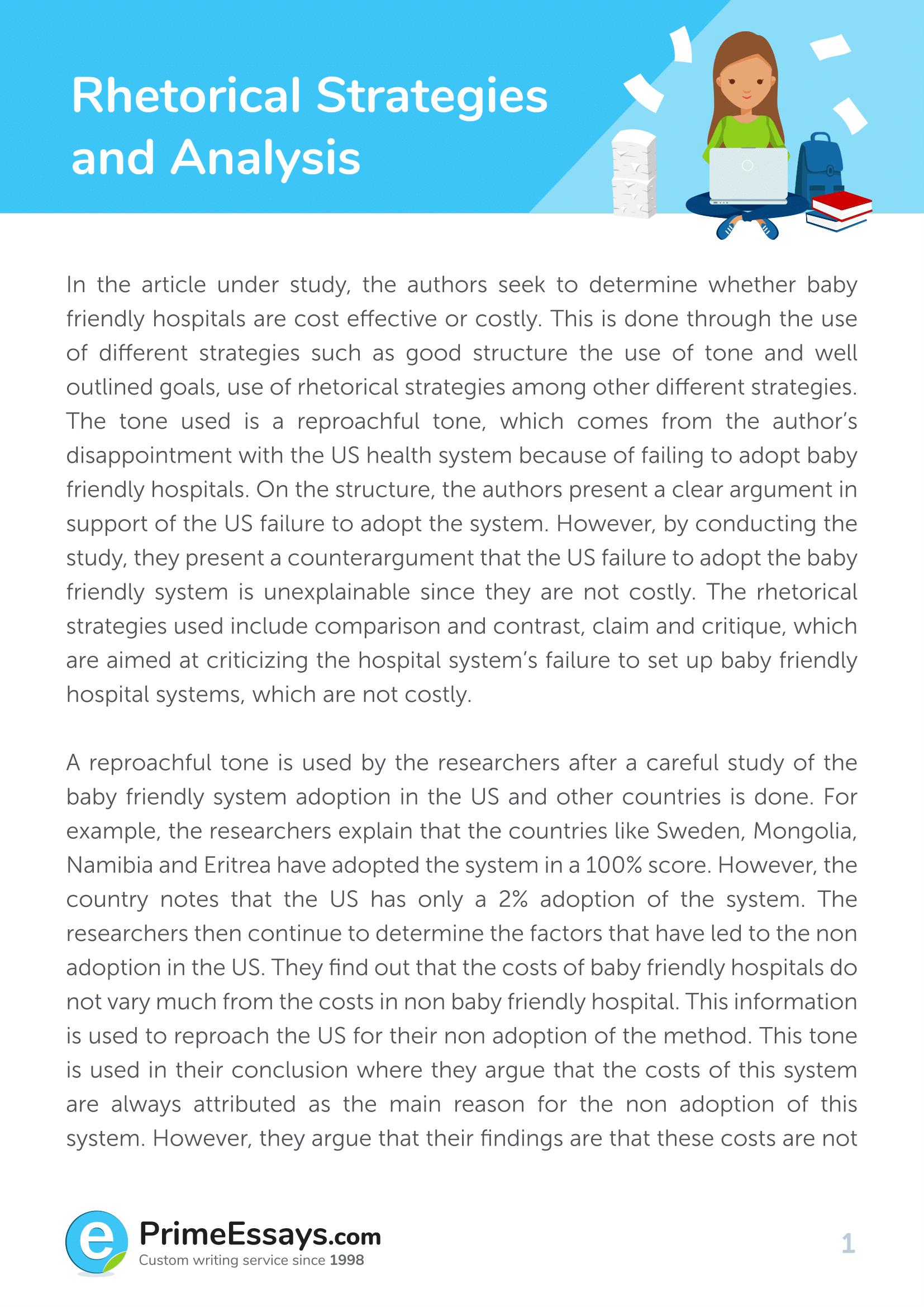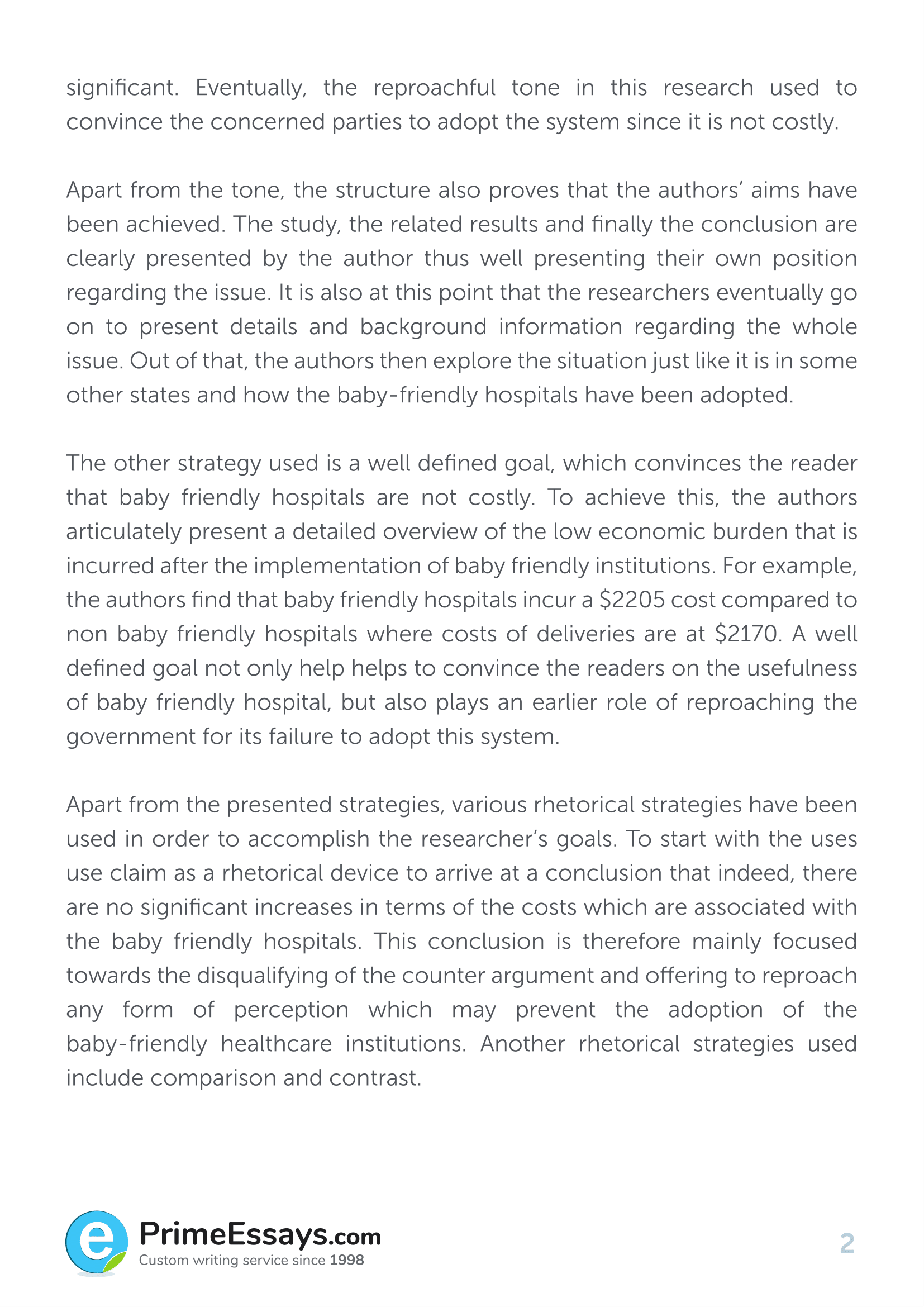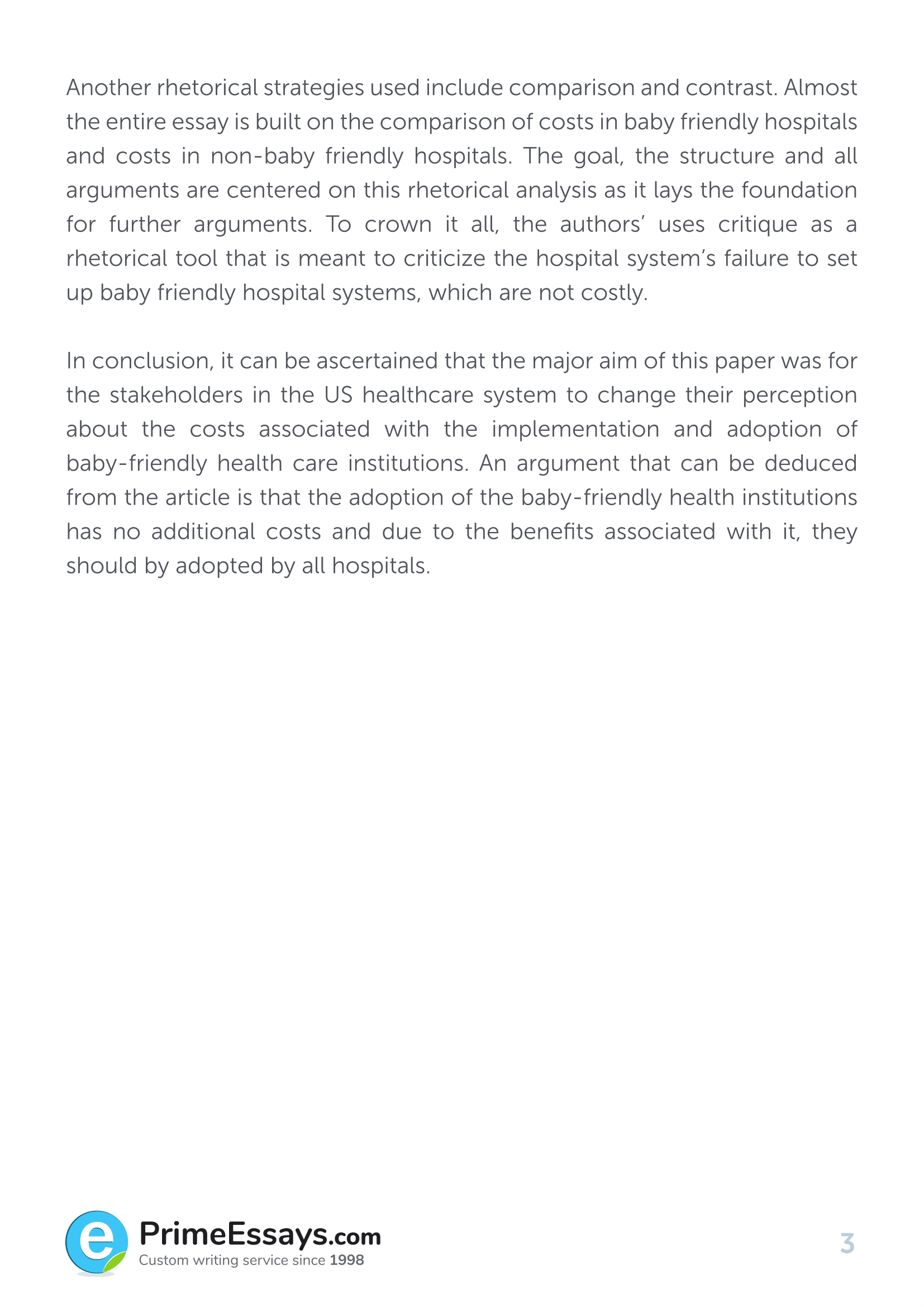- Essay
- Term Paper
- Research Paper
- Book Report
- Book Review
- Coursework
- Research Proposal
- Annotated Bibliography
- Test
- Answers Questions
- Multiple Choice Questions
- Dissertation
- Thesis
- Formating
- Editing
- Proofreading
- Rewriting
- Revision
- Powerpoint Presentation
- Poster Presentation
- Excel Exercises
- Thesis Proposal
- Case Study
- Discussion Board Post
- Dissertation Abstract
- Dissertation Introduction
- Dissertation Literature
- Dissertation Hypothesis
- Dissertation Methodology
- Dissertation Results

Table of Contents
Rhetorical analysis conclusion is a writer’s opportunity to draw their argument(s) to a close and say why patterns and techniques used in a text under analysis are significant. An effective rhetorical analysis essay conclusion does much more than just summing up the analysis by restating the patterns the writer or speaker used. Rather, rhetorical analysis conclusion helps summarize argument(s) so that the desirable result is achieved.
Rhetorical Analysis Definition
A rhetoric analysis is a kind of analysis that implies dividing non-fictional writing into sections and further paying close attention to the way each section works on its own and together with other parts to influence readers in a certain way.
This kind of analysis considers goals, tools, and examples that the author used and whether their application was effective. The rhetoric analysis does not require you to either agree or disagree with the argument but to discuss the way the argument is presented in and whether or not it is effective.
Calculate the price

Rhetorical Analysis Structure
The purpose of the introduction is to present your claim. If you make a claim concerning the author’s position on a specific matter, you should first briefly present some general background of this matter. It is important to keep in mind that your claim should begin together with the first line of your essay. At the same time, providing some background information will help your readers understand why your claim is relevant.
The body paragraphs always begin with topic sentences and thus, guiding every subsequent sentence in a paragraph with one common idea and ensuring you are not distracted by discussing irrelevant points. To make your essay coherent and cohesive, organize the body paragraphs so that they follow the order in which you presented your main ideas in the introduction. Think about your paragraph organization: you can discuss ethos, pathos, and logos along with their examples separately, and then, make a conclusion about their effectiveness; you can assess the least or the most effective techniques; or you can consider each technique used in the essay chronologically. For instance, when analyzing the Nacirema paper, you can first comment on its academic tone, then, on the diction, and last, on the common ground.
Include examples and their explanation in all paragraphs to demonstrate how the discussed technique works. When finishing the body paragraphs, you should check if the topic sentences are closely connected with a thesis statement. This will make your discussion strong, logically developed, and smooth.
While writing a conclusion for a rhetorical analysis essay, it is important to bear in mind that if the body of the essay explains how a rhetorical analysis achieves a particular effect, the rhetorical analysis conclusion paragraph should step backwards and say why the writer chose a particular technique. Furthermore, it needs to show the readers the effect(s) it achieved.
Rhetorical Analysis Essay Conclusion Examples
A rhetorical essay conclusion example can be used to help writers draft an effective concluding section. It should be noted that there are a few crucial steps to understand how to conclude a rhetorical analysis essay and to do it properly. These steps are as follows:
- First Step – Sum-up what was accomplished in the text you have been analyzing. For instance, persuade your readers to accept or believe in a particular idea.
- Second Step – Summarize how your goals were realized in your work. For example, how did the writer use evidence-based arguments while illustrating some point with an evocative and/or emotionally charged personal story or anecdote? If the analysis failed to achieve the intended goals, identify the reasons for it. Alternatively, what could or should have been done to make it effective?
- Third Step – Indicate why the rhetorical objective and method(s) are significant. Say, for example, how your view has altered because of a particular technique employed by the author. Focus your attention on a specific technique used by the author – such as outside research – and indicate why you think this technique is the perfect choice. You could additionally refer to your rhetorical analysis conclusion template and say why you believe a particular technique is right for the target audience.
When writing the concluding section, it is essential that any arguments the author presents are put into relevant context. The properly created rhetorical analysis conclusion should show that the analyzed argument(s) perfectly support the central theme.
Using a Rhetorical Analysis Essay Conclusion Example to End Your Paper Smoothly
Reaffirmation of a Thesis Statement
Referring to a rhetorical analysis conclusion example can help you reaffirm or reiterate your thesis statement. When you bring your analysis to its end, you need to do more than simply repeat your thesis – it needs to be reaffirmed. If you are using an expertly written example, you should clearly understand that while the writer restates their thesis, they use slightly different words while retaining original information. Thus, with a good example to guide you, you should learn how to:
Focus on the Main Points and Ideas
The main ideas in your rhetorical analysis essay should be restated in the conclusion. Hence, by referring to an example, you should see how to effectively restate the key points of your essay. So, when drafting your concluding paragraph, do not forget to explain the importance of your main ideas and/or assertions and how these add value to your thesis statement.
Bear in mind, that your conclusion should be relatively brief. The process of restating the main ideas should be no more than summing-up the essay’s argument(s).
Make Recommendations for Future Research
Similar to many types of essays, it is advisable to identify areas for further research and explain why this research should be undertaken. Say, whether you think there is any other information that would enhance your research work and analysis.
In these cases, having an example of a rhetorical analysis conclusion to refer to should help you identify what type of research can be done in the future, what it might entail, and how or why it might prove useful.
Moreover, using an example paper, you may learn how to highlight any issues and why future research is important.
It’s worth adding that a good example may serve as a great tool for learning how to end a rhetorical analysis essay. It can teach you to explain why your analysis is important to the target audience.
Rhetorical Analysis Essay Sample
How to Write a Conclusion for a Rhetorical Analysis Essay: More Details to Consider
So, how to write a conclusion paragraph for a rhetorical analysis essay effectively? Let’s delve deeper into the matter.
When writing the essay’s conclusion, try to avoid such phrases as “to conclude …” or “in conclusion …” and so on. A lot of writers are taught to end their essays with phrases like these. However, when obtaining a higher level of education, you should avoid these phrases. You won’t see them in any well-written example papers, because they tend to clutter the writer’s closing statement.
Another important point to remember is that the concluding section has to sum up the most important information provided in an essay. No new details are to be introduced in this section.
Finally, don’t include any judgments in the conclusion of a rhetorical analysis. Your task is to concentrate on how a point was made by the author rather than whether it was good or bad.
Our features

300 words per page instead of 280

Discount System

Vip Services

Revision within 2 days (on demand)

Affiliate Program

Plagiarism-free papers
Rhetorical Analysis Essay Conclusion as a Means of Developing Your Argument(s)
If you use a good example of a rhetorical analysis conclusion as a guide, you will be well-positioned to write an effective concluding paragraph. In short, you should be able to:
- Identify and Develop the Bigger Picture
Try to focus on the most important point, which you will explain in the later paragraphs. Encourage readers to research your topic further.
- Divide Your Main Argument
Remember that a rhetorical analysis is not always focused on the topics you are familiar with or have read about. Instead, it puts forward, supports, and enhances arguments concerning a particular topic aimed at a specific group of readers. Hence, your arguments may be based on additional material.
You are also required to determine if the author was or was not sufficiently persuasive. Therefore, in the conclusion of your essay, you need to clearly state why you think the author’s work was/was not persuasive and in what way. Say, what the author did to develop their arguments. Additionally, it is important to point out what he author’s greatest mistake is in your opinion, of course.
The Tradition of Rhetoric
Comparing and analyzing rhetorical techniques in a text may be complicated. Still, this is one of the most important aspects of a rhetoric analysis. Therefore, you do need to address the text’s rhetorical moves to make your paper complete and worthy. To get a better understanding how to do it, you may review a suitable rhetorical analysis essay conclusion example first.
This will help you create a conclusion that leaves readers with a powerful and long-lasting impression.
Analyzing the Rhetoric
The art of rhetoric analysis involves persuasion. So, try to end your essay in a way you feel will leave your readers swayed by your argument or the stance you have taken. You may go further and suggest alternatives to your arguments, which should help you persuade readers and add strength to your rhetorical essay conclusion.
It would be also good to mention whether the text touches on values, beliefs, and morals that are generally upheld by the society. For instance, a conclusion to an essay on luxury vehicles could show how humans hanker for convenience, comfort, and social status through acquisition of such possessions.
Don’t Know How to Write an Analysis Conclusion? We Can Help You!
Still find it hard to understand how to write a rhetorical analysis conclusion? Lack skills to do it on your own? It goes without saying that academic writing is not easy. If you are stressing over it, remember we are always ready and willing to help you! Our prices are affordable and our services are available 24/7. There are also other reasons why you should refer to PrimeEssays.com for professional help:
- Always Unique Content: All pieces of writing created by our writers are plagiarism-free. Our writers always write projects from scratch strictly following the provided instructions.
- Writers with Profound Knowledge in Various Fields: Your essay will be written by a writer, who has relevant skills and experience to create a specific piece of writing.
- Met Deadlines. We always deliver completed assignments on schedule. So, you can be sure that the deadline that you set will definitely be followed.
- Qualified Editors. We also have a team of very scrupulous editors, who proofread every paper so that it does not contain any mistakes.
- Strict Confidentiality: We never share any details related to our clients or their orders. You can be certain that no one will find out about our online cooperation.
To avoid stress caused by academic writing tasks, order your custom papers at PrimeEssays.com. You will enjoy our affordable prices, secure payment channels, high quality papers written in accordance with your instructions, and complete transparency. We will bring you one step closer to achieving success in your studies!
FAQ
A rhetorical analysis conclusion is the final section of your essay where you summarize key findings, restate the thesis, and highlight the impact of the analyzed work.
It’s usually one short paragraph, around 5–7 sentences, enough to wrap up the main points without adding new arguments.
Include a restated thesis, a brief summary of main points, and a final thought on the overall effectiveness of the author’s techniques.
No. The conclusion should only synthesize and reflect on ideas already discussed, not present new evidence.
Use confident language, connect your points to the bigger picture, and leave the reader with a memorable final impression.

















